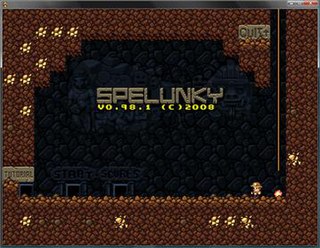
Rise of the Triad: Dark War is a first-person shooter video game, developed and published by Apogee Software in 1995. The player can choose one of five different characters to play as, each bearing unique attributes such as height, speed, and endurance. The game's story follows these five characters who have been sent to investigate a deadly cult, and soon become aware of a deadly plot to destroy a nearby city. Its remake was designed by Interceptor Entertainment and released by Apogee Games in 2013. The shareware version of the game is titled Rise of the Triad: The HUNT Begins.
Shit is an English-language profanity. As a noun, it refers to fecal matter, and as a verb it means to defecate; in the plural, it means diarrhea. Shite is a common variant in British and Irish English. As a slang term, shit has many meanings, including: nonsense, foolishness, something of little value or quality, trivial and usually boastful or inaccurate talk or a contemptible person. It could also be used to refer to any other noun in general or as an expression of annoyance, surprise or anger.

Roguelike is a style of role-playing game traditionally characterized by a dungeon crawl through procedurally generated levels, turn-based gameplay, grid-based movement, and permanent death of the player character. Most roguelikes are based on a high fantasy narrative, reflecting their influence from tabletop role-playing games such as Dungeons & Dragons.

Script Creation Utility for Maniac Mansion Virtual Machine (ScummVM) is a set of game engine recreations. Originally designed to play LucasArts adventure games that use the SCUMM system, it also supports a variety of non-SCUMM games by companies like Revolution Software and Adventure Soft. It was originally written by Ludvig Strigeus. ScummVM is free software that is released under the terms of the GNU General Public License.

Dave Grossman is an American game programmer and game designer, most known for his work at Telltale Games and early work at LucasArts. He has also written several children's books, and a book of "guy poetry" called Ode to the Stuff in the Sink.
GameMaker is a series of cross-platform game engines created by Mark Overmars in 1999 and developed by YoYo Games since 2007. The latest iteration of GameMaker was released in 2022.

It's Mr. Pants is a puzzle video game developed by Rare. It was published by THQ for the Game Boy Advance (GBA) handheld game console in North America and Europe in 2004–2005. A port of the game for mobile phones was developed and published internationally by In-Fusio in 2005–2006. The game stars Mr. Pants, a crudely drawn mascot formerly featured on Rare's website who had made cameo appearances in several prior Rare games.
Game Developer is a website created in 1997 that focuses on aspects of video game development. It is owned and operated by Informa and acted as the online sister publication to the print magazine Game Developer prior to the latter's closure in 2013.

Pajama Sam: No Need to Hide When It's Dark Outside is a 1996 children's adventure game originally released for PC and Mac. The first game of the Pajama Sam franchise, it sold nearly 3 million units and won 50 awards.

Spelunky is a 2008 source-available 2D platform game created by independent developer Derek Yu and released as freeware for Microsoft Windows. It was remade for the Xbox 360 in 2012, with ports of the new version following for various platforms, including back to Microsoft Windows. The player controls a spelunker who explores a series of caves while collecting treasure, saving damsels, fighting enemies, and dodging traps. The caves are procedurally generated, making each run-through of the game unique.
Ludum Dare is a game jam competition. It was founded by Geoff Howland and was first held in April 2002. It is currently run by Mike Kasprzak, who has been part of the team since the beginning. Participants are required to create a video game that fits within a given theme in two or three days. Participants often release a time-lapse video of the development of their game.

Andy Schatz is a video game designer based in San Diego. He began developing video games at a young age and graduated from Amherst College. After graduation, he worked for various video game development companies, including TKO Software, before founding his own independent video game development studio Pocketwatch Games in 2004. Attempting to expand his company, Schatz tried enrolling into business school; all applications were rejected. As a result, he began working on games he was passionate about. Schatz has released four video games under Pocketwatch Games: Wildlife Tycoon: Venture Africa, Venture Arctic, Monaco: What's Yours Is Mine, and Tooth and Tail. Monaco 2 is currently in development. His design philosophy revolves around taking inspiration from already existing media, such as films, and transforming it into a video game.

Quadrilateral Cowboy is a first-person puzzle-adventure video game by independent developer Blendo Games. The game was released on July 25, 2016, for Microsoft Windows, and on October 1, 2016, for macOS and Linux.

Rogue Legacy is a 2013 platform game with roguelike elements developed and published by Cellar Door Games. The game was released for Microsoft Windows, Linux, OS X, PlayStation 3, PlayStation 4, PlayStation Vita, Xbox One, Nintendo Switch, and iOS. A sequel, Rogue Legacy 2, was released on April 28, 2022 for Microsoft Windows, Xbox Series X/S and Xbox One.
Mondo Medicals is a freeware puzzle and indie game developed by Jonatan Söderström, released for Microsoft Windows on September 13, 2007 and later for macOS on December 24, 2010. The game involves the player trying to reach an exit in several mazelike levels by solving counterintuitive puzzles, against the backdrop of a surreal narrative revolving around the search for the cure for cancer.

The Seumas McNally Grand Prize is the main award given at the Independent Games Festival (IGF), an annual event that takes place during the Game Developers Conference, one of the largest gatherings of the indie video game industry. The award is named after computer game programmer Seumas McNally (1979–2000), founder of independent game development company Longbow Digital Arts. McNally died of Hodgkin's lymphoma shortly after receiving the award, then just the IGF Grand Prize, in 2000 for his game Tread Marks. The award is given alongside a prize of US$30,000.

Full Metal Furies is an action adventure video game developed and published by Cellar Door Games. Announced in February 2017, it was released on January 17, 2018 for Microsoft Windows and Xbox One.

Ninja Senki is a 2D action platform video game created by Canadian indie developer Jonathan Lavigne. It was inspired by classic NES games such as Ninja JaJaMaru-kun and Mega Man. The 8-bit style game has the same resolution as Game Boy console games.












